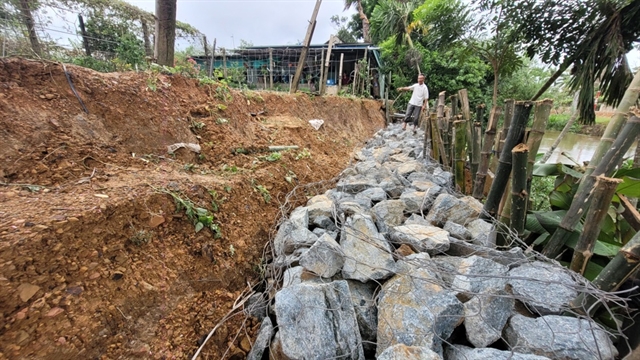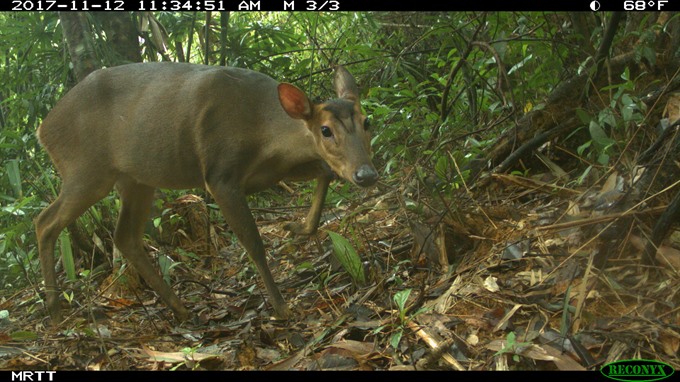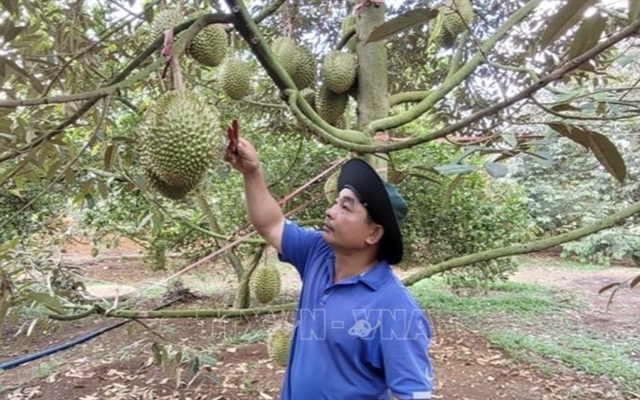 Environment
Environment

Two rare large-antlered muntjac have been photographed in a forest in Quang Nam Province, providing hope for the future of the species.
 |
| An individual of the large-antlered muntjac (Muntiacus vuquangensis) is caught by a camera trap in a forest in Quảng Nam. — Photo courtesy of Leibniz-IZW, WWF-Việt Nam, USAID, Forest Protection sub-Department of Quảng Nam Province |
QUẢNG NAM — Two rare large-antlered muntjac have been photographed in a forest in Quảng Nam Province, providing hope for the future of the species.
Scientists and conservationists of the Leibniz Institute for Zoo and Wildlife Research (Leibniz-IZW) and World Wide Fund for Nature (WWF)-Vietnam captured the images of the mammals, WWF-Vietnam announced Wednesday.
It said a camera trap was set up in the forest under a biodiversity monitoring and assessment activity supported by the US Agency for International Development (USAID).
This species has only been spotted on film in three protected areas in all of Việt Nam since the year 2000. The new photos from Quảng Nam Province – which include photographs of both a male and a female – provide hope for the species that is on the brink of extinction, according to WWF-Vietnam.
“It is amazing news,” said Phan Tuấn, director of the Forest Protection sub-Department of Quảng Nam Province.
“The two individuals are both mature and of reproductive age. These images prove that the species still survives in the province and give us hope that there might even be a breeding population.”
The large-antlered muntjac, which was discovered by scientists in 1994, is only found in the Annamites mountain range bordering Việt Nam and Laos. But illegal hunting, mostly using snares, has decimated the species in the area.
Snaring is common in the forests of central Việt Nam. From 2011 to 2017, government rangers and WWF Forest Guards removed more than 100,000 wire snares from the Thừa Thiên-Huế and Quảng Nam Saola Nature Reserves.
In 2016, in response to the decline of the species, the International Union for Conservation of Nature (IUCN)’s Red List of Threatened Species of the large-antlered muntjac was changed from ‘endangered’ to ‘critically endangered’.
Efforts have been continuing among conservationists to protect the large-antlered muntjac in the wild.
However, in recognition of the overwhelming pressure the species faces and the fact that its populations are critically low, the Government and international NGOs are planning to establish a captive insurance population for this species and the saola, also known as the Vũ Quang ox, spindlehorn or Asian bicorn – one of the world’s rarest large mammals. One saola was spotted in Vũ Quang Nature Reserve in 1999 and another in Quảng Nam Province in 2013.
The saola species is another recently-discovered endemic ungulate that is even rarer than the large-antlered muntjac and may be approaching extinction.
Dr Benjamin Rawson, the conservation director of WWF-Vietnam, noted: “Large-antlered muntjac do not currently exist in captivity, so if we lose them in the wild, we lose them forever.”
“Scientists are racing against time to save the species. Addressing the snaring crisis to protect wildlife in the forests of central Việt Nam and setting up captive assurance populations are vital if we are to succeed.”
Another camera trap funded by USAID also recorded other conservation priority species including Owston’s civet, Asiatic black bear, Annamite striped rabbit and the pangolin.
“Finding these rare and beautiful species gives new hope for Việt Nam’s precious biodiversity treasures,” said Nguyễn Văn Thanh, who led the field survey.
“Although populations of all ground-dwelling mammals and birds have declined from snaring, our results show that the forests of Quảng Nam Province still harbour globally-significant biodiversity,” he added.
The findings of this study will help the Forest Protection sub-Department of Quảng Nam develop better management and law enforcement plans to save these species and their habitats.
The Leibniz-IZW and WWF-Vietnam survey teams are expanding the systematic camera trapping plans to other areas in the region, including places with high biodiversity potential in the province of Thừa Thiên-Huế. — VNS









